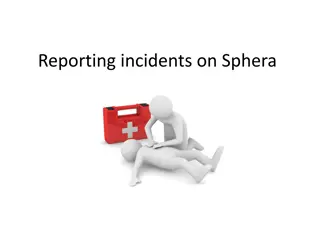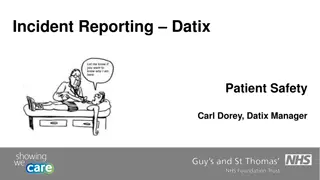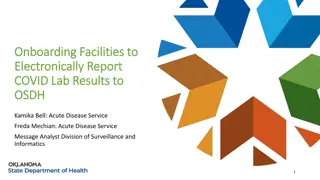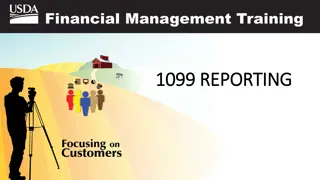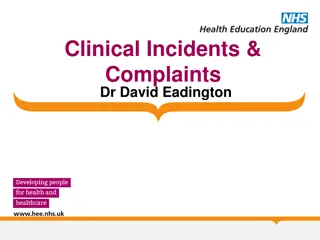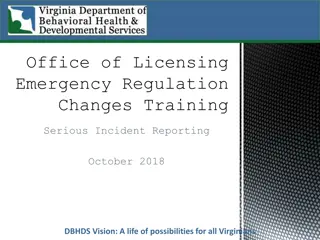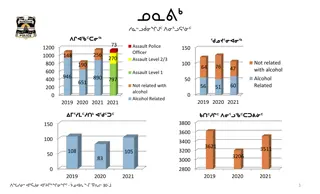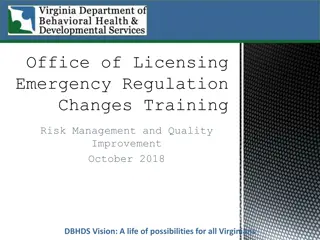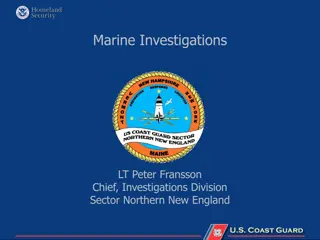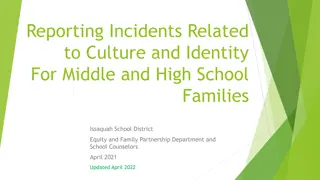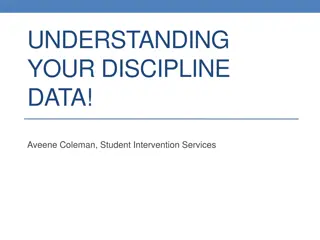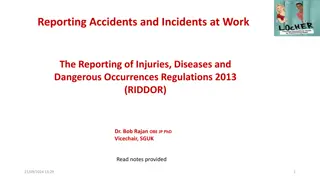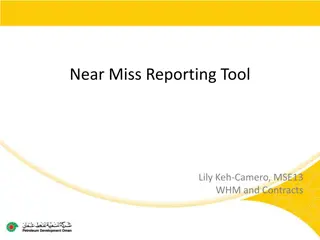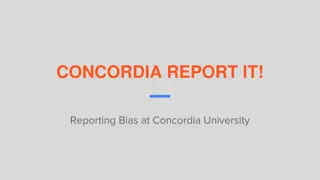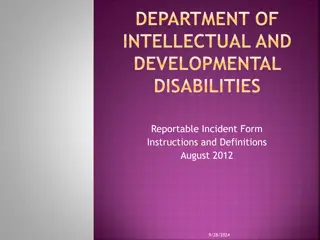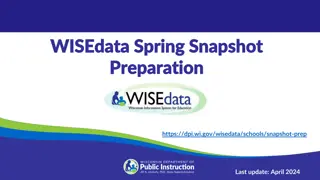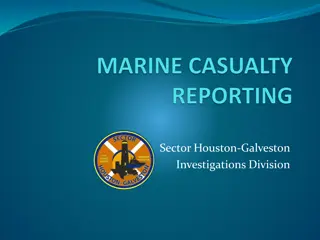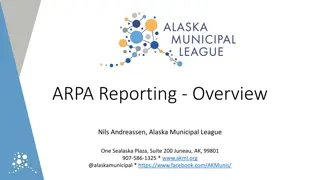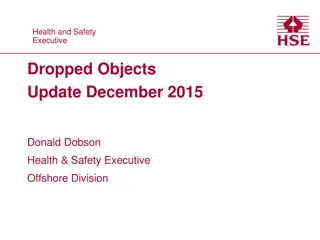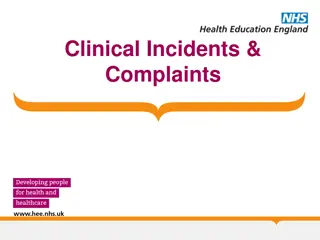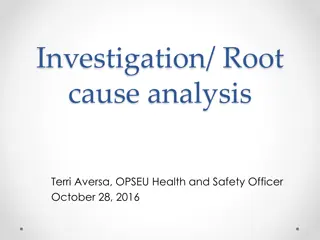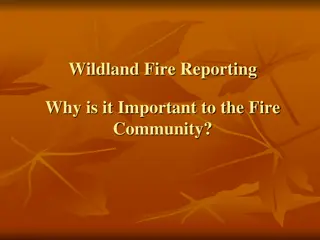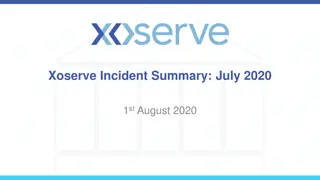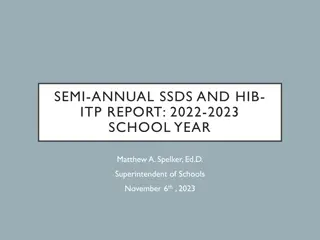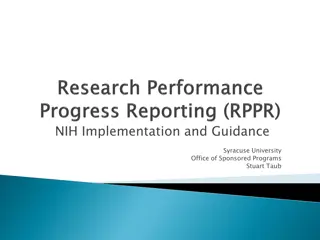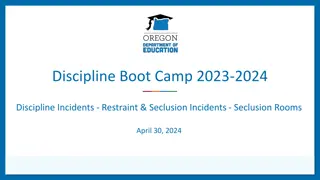Understanding Critical and Non-Critical Incidents in Incident Reporting
Critical incidents, as defined by regulations, are serious events that pose immediate risk to health, safety, or welfare. Non-critical incidents, on the other hand, are minor in nature and do not have serious consequences. Incident reports play a crucial role in documenting occurrences, identifying
0 views • 29 slides
ECC Social Value Reporting and Evaluation Framework
Essex County Council (ECC) has implemented a robust Social Value Reporting and Evaluation framework based on the Local Government Association's National TOMs method. This framework categorizes and assesses social value contributions in two parts - Value Score and Supporting Statement Score - to deri
3 views • 16 slides
Efficient Near Miss Reporting via QR Codes
Near miss reporting via QR codes offers a streamlined and efficient method for employees to report potential hazards or incidents. This system involves generating unique QR codes linked to a reporting system, strategically placing them in areas prone to near misses, enabling easy employee interactio
2 views • 8 slides
Reporting Incidents on Sphera
The Council utilizes Sphera to manage health and safety risks, requiring employees to report accidents, near misses, violence incidents, and more promptly. This guide explains how to report incidents on Sphera, including accessing the reporting portal, completing mandatory fields, and obtaining pape
9 views • 26 slides
Understanding Incident Reporting in Healthcare
Incident reporting in healthcare is crucial for patient safety and organizational improvement. An incident can encompass a wide range of events that cause or have the potential to cause harm, loss, or damage. Reporting incidents, including near misses, allows for learning from both mistakes and succ
0 views • 10 slides
Process Safety Incidents and Prevention Best Practices
Process safety incidents involving hazardous materials like caustic solutions, ammonia leaks, and TFE have caused injuries and fatalities. Key incidents include burns from caustic exposure, fatalities due to ammonia leaks, and an explosion from improper TFE handling. Learning from these incidents hi
7 views • 21 slides
Streamlining Electronic Reporting of COVID Lab Results to OSDH
This documentation outlines the process of electronically reporting COVID lab results to the Oklahoma State Department of Health (OSDH). It covers the purpose, available options, specifications, formats, and the onboarding and testing process, aiming to accelerate the reporting of healthcare facilit
0 views • 9 slides
Overview of 1099 Reporting Systems
The 1099 Reporting Systems consist of MINC, EARN, and SPPS, which are used for IRS 1099 reporting purposes. These systems handle transactions and generate Form 1099 for recipients based on predefined criteria. Taxpayers are responsible for accurate reporting to the IRS, with reporting thresholds set
0 views • 15 slides
Clinical Incidents and Complaints: Understanding, Management, and Prevention
Explore the definition of clinical incidents, learn how to recognize and react to them, understand patient complaints, and discover ways to prevent incidents and complaints in healthcare settings. Discover who to report incidents to and how healthcare organizations handle complaints. Gain insights i
0 views • 12 slides
Understanding Level I Serious Incidents Reporting
Defining and discussing Level I Serious Incidents in the context of DBHDS regulations, including the criteria, reporting requirements, and examples. Learn how to identify, document, and analyze incidents that occur during service provision or on provider premises, ensuring the safety and well-being
0 views • 41 slides
Analysis of Assault Incidents in Relation to Police Officers
This data presents a detailed analysis of assault incidents involving police officers, categorized by assault level, alcohol-related factors, and year. The data covers non-criminal and criminal incidents, as well as the combined total incidents over the years 2019, 2020, and 2021.
0 views • 36 slides
Project 2009-01 Event Reporting Updates
The Project 2009-01 Event Reporting process underwent revisions to address industry comments and incorporate FERC directives. Changes included updating reporting standards, addressing double jeopardy concerns, and aligning with FERC Order 706. Despite multiple comment rounds, challenges such as conf
0 views • 19 slides
UNEP Support for Improving UNCCD Reporting Procedures
UNEP has been providing support since 2010 to enhance the reporting processes of the UNCCD, focusing on streamlined funding approaches, technical assistance, and capacity building. Key outcomes include the development of reporting tools, online reporting systems, and building credible data from coun
0 views • 14 slides
Climate Change Monitoring, Reporting, and Verification (MRV) Training Session Overview
This document outlines the purpose and reporting requirements for the development of a Climate Change Monitoring, Reporting, and Verification (MRV) system, focusing on projections and scenarios. It highlights the importance of collecting information for climate mitigation, assisting Serbia in meetin
0 views • 19 slides
Transitioning to Incident-Based Crime Reporting: Enhancing Transparency and Accountability
Anytown Police Department (APD) is leading the transition from Summary Reporting to Incident-Based Reporting through the National Incident-Based Reporting System (NIBRS). This change promotes transparency, provides detailed crime data to the public, and improves statewide and national crime statisti
3 views • 17 slides
Insights into Structured Reporting Practices in Colorectal Cancer Imaging
A survey conducted by Dr. Eric Loveday at North Bristol NHS Trust revealed the current landscape of structured reporting in MRI and CT scans for rectal and colon cancer. Results indicate a positive outlook towards implementing national standards for structured radiology reporting, with an emphasis o
0 views • 7 slides
Regulatory Changes and Quality Improvement in October 2018
The content discusses regulatory changes related to risk and quality improvement in October 2018, focusing on serious incidents, reporting requirements, risk management, and monitoring service quality. Providers are mandated to review, analyze trends, identify systemic issues, recommend remediation,
0 views • 31 slides
Important Guidelines for Reporting Marine Casualties
Learn about the NVIC 01-15 regulations for immediate reporting of hazardous conditions and marine casualties to the Coast Guard. Understand the responsibility of notifying the Command Center in case of incidents, reporting injuries involving passengers and crew, and the criteria for serious marine i
0 views • 21 slides
Responding to Incidents Related to Culture and Identity in Issaquah School District: Parent Workshop Summary
In this session by the Equity and Family Partnership Department along with school counselors in Issaquah School District, parents were guided on how to support their children in reporting and responding to incidents related to culture and identity at middle and high school levels. The importance of
0 views • 26 slides
Understanding Discipline Data Collection in Educational Institutions
The data illustrate the importance of accurately reporting discipline and truancy data using Incident Management Systems in educational institutions for the 2019-20 school year. The process involves coding data in Incident Management, avoiding additional codes, and adhering to federal reporting requ
0 views • 60 slides
Reporting Accidents and Incidents at Work: Understanding RIDDOR Regulations 2013
The Reporting of Injuries, Diseases, and Dangerous Occurrences Regulations 2013 (RIDDOR) outlines the legal requirements for reporting work-related accidents and incidents. It specifies what must be reported, who to report to, types of reportable accidents, recording requirements, and how to report
0 views • 9 slides
Improving Near Miss Reporting for Enhanced Workplace Safety
Implementing a comprehensive Near Miss Reporting Tool is crucial for creating a safe work environment. The tool facilitates the reporting of near misses without fear of repercussions, enabling companies to identify weaknesses in safety programs and proactively eliminate hazards. Challenges include t
0 views • 12 slides
Understanding Disability Hate Crime and Hate Incidents
Disability hate crime and incidents involve criminal offenses or non-crime incidents perceived as motivated by hostility or prejudice towards a person's disability. Key elements include hostility, prejudice, perception, and may involve racial, religious, or sexual orientation hate. Perceptions are c
0 views • 16 slides
Addressing Bias-Related Incidents at Concordia University
The report discusses bias reporting at Concordia University, highlighting the importance of understanding and addressing bias-related incidents. It covers examples of bias, distinction between bias incidents and hate crimes, and strategies for response. Presenters from the Office of Multicultural En
0 views • 11 slides
Simpler Systems Reporting Pilot for Financial Data Enhancement
The Simpler Systems Reporting Pilot is underway to enhance financial data reporting at the university campus. Led by Vice President Ryan Nesbit's team, this initiative aims to improve University-wide financial reporting mechanisms and accessibility to data through the Simpler tool. The pilot include
0 views • 5 slides
Understanding Reportable Incidents in Developmental Disability Care
The report outlines the criteria for incidents to be classified as reportable in the context of intellectual and developmental disabilities care. It covers various types of incidents, including abuse, neglect, serious injuries, and behavioral or medical incidents requiring specific interventions. Th
0 views • 28 slides
Overview of WISEdata Snapshot Preparation and Reporting Requirements
The WISEdata Snapshot Preparation provides crucial details on data entry, validation, and reporting processes for educational institutions. It outlines the importance of accurate data collection for federal reporting, public reporting, and funding determinations. Additionally, the Snapshot Reporting
0 views • 41 slides
Reporting Requirements for Marine Casualties in Sector Houston-Galveston Investigations Division
Sector Houston-Galveston Investigations Division outlines the reporting procedures for marine casualties including when to report, reportable casualties, serious marine incidents, required chemical testing, and reporting forms. Reporting must be done promptly and accurately to ensure safety and comp
0 views • 11 slides
Ensuring Chemical Reporting and Preparedness at the DEQ
The Chemical Reporting and Preparedness section at the DEQ focuses on regulations under EPCRA, prompted by incidents like the Bhopal tragedy. EPCRA covers Tier II reporting, spill reporting, LEPCs, State Emergency Response Commission, and Oklahoma Hazardous Materials Emergency Response Commission. T
0 views • 17 slides
ARPA Reporting Overview and SLFRF Guidelines in Alaska
This document outlines the reporting overview for the ARPA (American Rescue Plan Act) and specific guidelines for the Coronavirus State and Local Fiscal Recovery Fund (SLFRF) in Alaska. It covers acceptance, use, and reporting of funds, as well as designating staff roles for managing reports. The co
3 views • 22 slides
Offshore Health and Safety Executive Report on Dropped Objects Incidents in 2015
The Health and Safety Executive report provides a detailed overview of dropped objects incidents in the offshore industry during 2015. The report includes data on quarterly totals, types of incidents, and specific cases of objects being dislodged and falling. Various scenarios involving derricks, cr
0 views • 13 slides
Clinical Incidents, Complaints, and Learning Objectives in Healthcare
Understand the importance of recognizing and reacting to clinical incidents, handling patient complaints, and learning from adverse events. Learn about the definition of clinical incidents, who to inform, and the process of reporting incidents in healthcare settings. Discover reasons behind patient
0 views • 12 slides
Workplace Incident Investigation and Root Cause Analysis
Workplace incident investigations are crucial for preventing future incidents. They help determine what happened, identify causes, and uncover unsafe conditions or procedures. By conducting thorough investigations, management can take corrective actions and demonstrate commitment to safety. Understa
0 views • 17 slides
Feedback Analysis on Medication Incident Reporting in Hospitals
Feedback received from IMSN members on NIMS and incident reporting revealed various issues affecting the rates at which staff report medication incidents/near misses within hospitals. Major themes included staffing numbers and turnover, pharmacist involvement in incident reporting, clinical pharmacy
0 views • 12 slides
Importance of Wildland Fire Reporting to the Fire Community
Wildland fire reporting plays a critical role in providing accurate data for effective fire management. Defined state fires and challenges in reporting impact funding, risk management, and agency support. Comprehensive reporting like the Wildland Fire Occurrence Reporting for Massachusetts is essent
0 views • 6 slides
Understanding Serious Incidents Reporting and Investigations in Bikeability Program
The Serious Incidents Reporting and Investigations guide provides crucial information on responsibilities, reporting procedures, and types of incidents such as safeguarding, health and safety, data breaches, and risks to reputation. It emphasizes timely reporting, record-keeping, and continuous lear
0 views • 20 slides
Xoserve Incident Summary - July 2020
This presentation provides an overview of P1/2 incidents experienced by Xoserve in July 2020. It describes high-level impacts, causes, and resolutions undertaken by Xoserve to address the incidents. The information is shared to give customers insight into Xoserve's platforms supporting critical busi
0 views • 7 slides
School Safety Report for 2022-2023 Academic Year
The school safety report for the 2022-2023 academic year highlights key data on incidents reported through the Student Safety Data System (SSDS) and the Electronic Violence & Vandalism Reporting System (EVVRS). The report covers various aspects such as incidents of harassment, violence, vandalism, a
0 views • 9 slides
Streamlining Research Progress Reporting for NIH Awards
Research Performance Progress Report (RPPR) is a standardized mechanism to facilitate interim progress reporting for NIH-funded projects, aiming to enhance consistency and minimize administrative burdens. It replaces the eSNAP process for certain types of awards and fellowship grants. RPPR includes
0 views • 12 slides
Oregon Department of Education Discipline Data Collection 2023-2024
Oregon Department of Education presents information on discipline incidents, restraint, seclusion incidents, seclusion rooms, data collection training materials, information security, and what's new for 2023-2024. They emphasize the purpose of collecting student-level records about discipline incide
0 views • 52 slides



